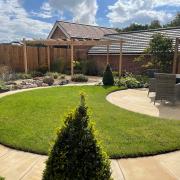
Ro Barratt
Stockport champion and Foodie Friday organiser
'Back in 2011, Stockport was getting negative press. We wanted to tell all the positive stories about the people and the places'
One of my earliest childhood memories is being led by the hand through a bustling Stockport Market as my mum took me shopping. The sights and the smells were so enticing, with stalls and people as far as the eye could see.
Fast forward 50 years and it's wonderful to see the Market Place equally vibrant as thousands of visitors flock to the monthly food festival I organise with my husband John. Foodie Friday has become an institution in the town. It’s the place where friends, families and workmates arrange to meet up on the last Friday of the month. We’re proud that Foodie Friday has been the catalyst for the regeneration of the town. Last year we were honoured to receive two awards from the Manchester Food and Drink Festival. Foodie Friday won the Best Pop-Up Event for the second time and John and I also received the prestigious Howard and Ruth Award for Outstanding Achievement, which was overwhelming as it was voted for by the public.
For the past 12 years, Stockport has been the constant focus of our lives. Like me, my husband John is Stockport born and bred and has a burning passion for the town. It was reignited when we first heard about the monthly Vintage Village in Stockport Market Hall, the stunning example of Victorian architecture in the Market Place known as the Glass Umbrella. We visited one Sunday and all those nostalgic, warm and fuzzy memories of the market came flooding back.
Before we knew it, we were making a documentary about the vintage market for Screen Stockport, the film festival we started as a family, with our teenage sons Joe and Tom presenting and filming. Back in 2011, Stockport was getting negative press and appeared in the Crap Towns book. We wanted to tell all the positive stories about the people and the places.
Like many towns at the time, Stockport was struggling with empty shops and lack of footfall. Joe and Tom came up with an inspirational idea to help attract young people back into the town centre by creating The Teenage Market in Stockport Market. There was an amazing response and we had more than 70 stalls run by teenagers promoting their creative business ideas. The event is now run all over the country.
We were asked to be part of Stockport’s winning bid for government funding from the Portas Pilot, the high-street regeneration project spearheaded by Mary ‘Queen of Shops’ Portas. This helped us to establish Seven Miles Out, a community arts and music venue in an empty unit in the Market Place, which we ran for five years. The wonderful people we met there have become friends for life and still support all our cultural projects.
The Stockport Old Town brand we created has become synonymous with independent shops, cafés and bars and the town is now being written about positively in The Guardian and cited in The Times as one of the best places to live. The band Blossoms deserve a lot of credit as they have really put Stockport in the spotlight on the world stage. They launched their second No.1 album, Cool Like You, from an ice cream van at Foodie Friday and they are featured heavily in our latest project, The Stockport Music Map, which highlights Stockport’s musical history from the 1960s to the present day.
John and I now run music tours through the town highlighting significant landmarks such as the iconic Strawberry Recording Studios where so much influential Manchester music was produced.
I feel we’ve been on a real journey of discovery with the town and it’s gratifying to see it finally getting the recognition it deserves. As our good friend Frank Sidebottom (the comic persona of the late musician, comedian and frontman of the band the Freshies Chris Sievey), once said, 'Stockport is really fantastic. You know it is, it really is.'

Andy Spinoza
Author and journalist, Heaton Moor
'There’s this magnificent suburb with good schools, nice parks and excellent independent shops nestled between Didsbury and Stockport'
The bizarre thing about Heaton Moor is I lived there for a year in my second year at Manchester University. It was very studenty, with property divided up into mixed houses, so when my young bride Lynne and I decided to look for a home to buy, I asked her if she knew Heaton Moor. She didn’t, and a lot of people still don’t know about it. They don’t realise there’s this magnificent suburb with good schools, nice parks and excellent independent shops nestled between Didsbury and Stockport. With a 12-minute train ride into Manchester and a bus stop almost outside my house, I think it is supremely set up.
Of course, it has had rocketing property prices over recent years and you see that effect rippling into Reddish, Heaton Norris and Levenshulme. I have been travelling up and down the A6 for years, from the days when you’d get a taxi from the city centre and the Manchester driver would stop at McVitie's biscuit factory and say, ‘we are now crossing the boundary from Manchester to Stockport, I’ve got to charge you an extra pound.’ I go back that many years!
I've always said if Levenshulme became gentrified and you were to see hipster couples pushing their buggies around, carrying copies of the Sunday Times and their coffee in their recycled cups; if that ever happens then something seismic will have shifted in Manchester’s property market. And that’s exactly what has happened in the past few years.
Living in Heaton Moor meant I was well placed to work on the Diary pages at the Manchester Evening News, then later at my city centre PR agency Spin Media, and it is where I wrote my book, Manchester Unspun, my part-economic and political history, part-memoir that was published earlier this year).
I’ve always tried to be the dictator of my own destiny. I closed my PR agency because of Covid and it would have been easier to do PR in a semi-retired sort of way but when Jon Savage, writer, and professor of popular culture at the University of Manchester, came to my house to look at my collection of 25 boxes of yellowing music papers when he was putting together the British pop archive at John Rylands Library, he told me it was important material and he acquired it for the library. He also suggested I write a book – and I did.
When researching, I had three sources, the first was memory – I would often regale mates in the pub with anecdotes from my life as a journalist and PR. Then I had 300 copies of City Life magazine, from 1993 until it closed in 2002 (a semi-underground publication set up by Andy, Ed Glinert and Chris Paul), which were a good source, along with the Manchester Evening News Diary; I worked on it for 10 years, so there was a record of what I had been doing and where I had been as I had written it all up.
Thirdly, when you run a PR agency you have to provide the cuttings from newspapers as a record of what you have done, so I’d been in at the launch of the Lowry Hotel, the Lowry Arts Centre, Beetham Tower, Urbis, the Malmaison Hotel. I was involved with the Manchester congestion charge, the BBC move to Media City in Salford... All these memories were what inspired the book.
When I work from home, I’m surrounded by a badly organised library of source material, and you do go mad when you write a book. I’m a gregarious person who likes being more collaborative, so sitting down at a PC, effectively for two years, was very hard but once I started it, I had this engine propelling me to the finish line.

Des O’Malley
Busnessman, Heaton Moor
'There are definitely more people buzzing around and there’s lots of scaffolding going up and lots of skips, which bodes well'
I have a little café bar called Nook in Heaton Moor. It all happened by accident really as I’m involved with property development, but I ended up getting into hospitality because I’m into coffee and here I am nine years later.
Heaton Moor has seen a big change. Around two years after the BBC moved up here, you really saw a transformation for the better. It’s now a much more modern place to be, whereas before it felt like old Stockport.
Almost 20 years ago in 2003/2004, I invested in Underbanks in Stockport city centre and we were all very excited at the time; we thought it was going to be the next Northern Quarter but the crash of 2008 scuppered all that and now two decades later we are having the same conversation. This time around I do feel we’ve hit that peak point and that things will happen. There are lots of big schemes in Stockport. We’ve got the Capital and Centric development at Weir Mill as well as the huge M&S conversion scheme (the former Marks & Spencer building in Merseyway, which is being turned into office, leisure and retail space) so there are lots of significant projects going on.
Stockport Council, in the main, is pretty good. It's getting these key schemes going in and around the town and hoping the micro businesses will fill in the gaps.
While the expectation is great, the reality has to catch up to the PR, but there are definitely more people buzzing around and there’s lots of scaffolding going up and lots of skips, which bodes well.
I bought the old Royal Bank of Scotland building in December 2019, but little did I know what was going to happen to change the world six months later. We are just now starting to focus again; it’s been tough. Recently we filled the top floor of the building with a co-operative of artists called Underbank Studios and on the second floor, we’ll get some more indies in there. We are aiming at the artsy crowd – the creatives – and everything that usually follows after that. Meanwhile, down in the old bank vault there’s an enormous space that has been turned into a recording studio called Vault Productions and hopefully, that’s going to tie in with the Great Underbank event space, Syndikat. On the ground floor we have a live music venue. During the day we’ll be serving coffee and later it will morph into a night-time venue. There’s a lot of collaboration that’s going to be happening between the people on various floors.
Things tend to move slowly as I’ve learned from being involved in Liverpool and the early days in Manchester and Northern Quarter. It’s all about getting and curating the right mix, so the council is really pushing for more food businesses down here.
A town centre needs residents and with developments such as Capital and Centric, you’re looking at another 5,000 people living here within five years, which will transform everything.



























